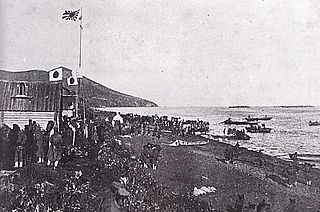 W
WThe following are known battles of the Russo-Japanese War, including all major engagements.
 W
WThe Battle of Hsimucheng was a minor land engagement of the Russo-Japanese War. It was fought on 31 July 1904 near Hsimucheng, a hamlet about 20 kilometres (12 mi) southeast of the strategic junction town of Haicheng, on the main road connecting Haicheng with the coast between elements of the Imperial Japanese Army and the Imperial Russian Army.
 W
WThe Battle of Liaoyang was the first major land battle of the Russo-Japanese War, on the outskirts of the city of Liaoyang in present-day Liaoning Province, China. The city was of great strategic importance as the major Russian military center for southern Manchuria, and a major population center on the main line on the Russian South Manchurian Railway connecting Port Arthur with Mukden. The city was fortified by the Imperial Russian Army with three lines of fortifications.
 W
WThe Battle of Motien Pass was a minor land battle of the Russo-Japanese War, fought between the Imperial Japanese Army under General Kuroki Tamemoto and the Imperial Russian Army under General Count Fedor Keller over control of a strategic mountain pass on the main road between the coast and Liaoyang, Manchuria on 10 July 1904.
 W
WThe Battle of Mukden , one of the largest land battles to be fought before World War I and the last and the most decisive major land battle of the Russo-Japanese War, was fought from 20 February to 10 March 1905 between Japan and Russia near Mukden in Manchuria. The city is now called Shenyang, the capital of Liaoning province in China.
 W
WThe Battle of Nanshan was one of many vicious land battles of the Russo-Japanese War. It took place on 24–26 May 1904 across a two-mile-wide defense line across the narrowest part of the Liáodōng Peninsula, covering the approaches to Port Arthur and on the 116-meter high Nanshan Hill, the present-day Jinzhou District, north of the city center of Dalian, Liaoning, China.
 W
WThe siege of Port Arthur was the longest and most violent land battle of the Russo-Japanese War.
 W
WThe invasion of Sakhalin was the last land battle of the Russo-Japanese War, and took place from 7 July to 31 July 1905.
 W
WThe Battle of Sandepu was a major land battle of the Russo-Japanese War. It was fought within a group of villages about 36 miles (58 km) southwest of Mukden, Manchuria.
 W
WThe Battle of Shaho was the second large-scale land battle of the Russo-Japanese War fought along a 37-mile (60 km) front centered at the Shaho River along the Mukden–Port Arthur spur of the China Far East Railway north of Liaoyang, Manchuria.
 W
WThe Battle of Tashihchiao was a land engagement fought on 24–25 July 1904, during the Imperial Japanese Army's advance toward Liaoyang in first stage of the Russo-Japanese War. Tashihchiao is located about 25 kilometres (16 mi) southwest of the city of Haicheng, in present-day Liaoning Province, China. The town of Tashihchiao was of strategic importance in the Russo-Japanese War, as it was a railroad junction between the main line on the Russian South Manchurian Railway and a spur which led to the old treaty port of Yingkou (Newchwang). Control of both was essential for further advances by Japanese forces towards Liaoyang and Mukden.
 W
WThe Battle of Te-li-ssu, also called Battle of Wafangou after the nearby railway station, was a land battle of the Russo-Japanese War. It was fought at a hamlet some 80 mi (130 km) north of Port Arthur, Manchuria. The hamlet is known today as Delisi, and is located just north of Wafangdian, Liaoning Province, China. It was fought on 14–15 June 1904 between the Japanese Second Army under General Oku Yasukata and the Russian First Siberian Army Corps under Lieutenant General Georgii Stackelberg.
 W
WThe Battle of the Yalu River lasted from 30 April to 1 May 1904, and was the first major land battle during the Russo-Japanese War. It was fought near Wiju on the lower reaches of the Yalu River, on the border between Korea and China.